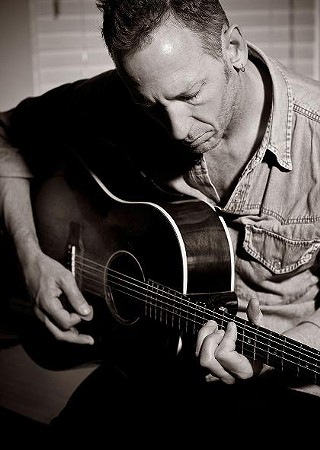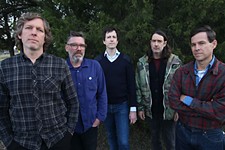Soldiering On
Darden Smith helps give a voice to veterans
By Austin Powell, 8:43AM, Wed. Sep. 7, 2011
“People speak in poetry,” posits Darden Smith, “and everyone has a story.” Few personal narratives, however, come as emotionally charged as those of veterans of the armed forces. In July, Smith helped host the Soldier Songwriting Project, a three-day co-writing workshop with 10 servicemen and women to help capture those stories in song.
On Sunday, the 10th anniversary of the attacks on the World Trade Center, Smith will premiere the results of those sessions at the Faces of Freedom concert at the World Arena in Colorado Springs, CO. Six of the songs, which were recorded in Nashville, will be made available soon after on iTunes and Smith’s site.
The local troubadour opened up on the process of giving voice to soldiers and helping heal that divide.
AC: Were the soldiers involved in the actual songwriting process?
DS: They were right there with us the whole time. Though they may weren't 'songwriters.' they were active in the writing process and they're all listed as co-writers on the copyrights.
These are smart, smart people who've been on an edge that I can only imagine. The definitely have something to say, and they do so in a way that I never could. They don't mess around with bullshit, and they'll call you on it. Fast. People know what's real and what isn't. When you establish trust and they feel they can tell you what they think, they will.
AC: Can you tell me a little bit more about the collaborative process?
DS: We sat with them and just started a conversation. As writers, we're waiting for them to give us a hook, a window into the story, something to hang it on. Once we have that, it's just about fitting their words into some sort of melody and lyric structure, telling that story, getting to the truth.
AC: As a songwriter, I would imagine that being told a story first-hand has a far greater intensity than being inspired by events/people once removed. Creatively, what sort of reaction were these stories having on you?
DS: It was very, very intense. You're talking with them and hearing their stories about, war, and its effects on their minds, their bodies, spirits, what it's like for them to come back to States and into this culture again. These are things that I or the other writers have zero experience with, so it's incredibly emotional for all concerned. There's lots of power in their stories. The magic of songwriting is that you take a story, put some words with a melody, and it becomes something else entirely, something that other people can hear and identify with. As I said earlier, the difficult part was just keeping it together in order to write the song before we all broke down.
AC: What did you take away personally from this project?
DS: Many things, but most of all, respect. Respect for these men and women and for what they gave. They've seen the highest and the lowest of human nature. They've been where I haven't. The reason I started this project was that I realized I had always participated in the very prevalent 'us and them' attitude that exists in our culture towards the military. It comes from a post-Vietnam thing. I'm still anti-war, but I'm very pro-human. These are humans.
So, how could I use songwriting to bridge that divide, to 'see' these people for who they are, and, in some small way, to show them that we 'see' them for who they are, acknowledge them; to try to turn it from an 'us and them' to an 'us' situation.
As well, it reinforced the knowledge that I've picked up through this and other work I've done over the last couple of years, that people who've gone through some sort of trauma often speak very poetically about it, using very simple words about very difficult things. And when you give them the chance to turn those experiences into songs it can be very powerful for all concerned: for them, the writer, and for someone who may hear the song.
AC: Is this something that you would like to do more of in the future?
DS: Yes, we have another retreat with vets planned for January and we hope to continue from there. It fits in with the work I've been doing with the Be An Artist Program. Along with the work with vets, I'm in the middle of a long-term project in Newark, New Jersey at a homeless shelter called Covenant House, writing songs with young adults. It's all of a piece for me. Using songwriting to tell stories, open other people up to their potential, get some good songs.
A note to readers: Bold and uncensored, The Austin Chronicle has been Austin’s independent news source for over 40 years, expressing the community’s political and environmental concerns and supporting its active cultural scene. Now more than ever, we need your support to continue supplying Austin with independent, free press. If real news is important to you, please consider making a donation of $5, $10 or whatever you can afford, to help keep our journalism on stands.









